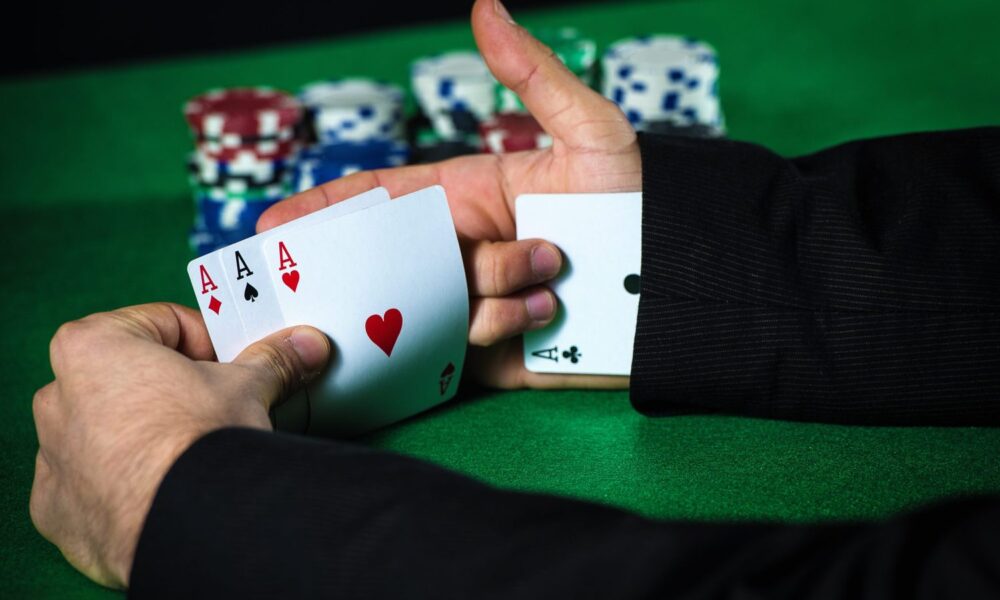Attendees at the World Game Protection Conference in Las Vegas ranked the baccarat cut card as the No. 1 Scam of the Year casinos faced in 2024. Ranking the scams is a “celebration” of the casino industry uncovering ways that cheats threaten their properties, conference host Willy Allison said.
To close the conference last week at the Rio Las Vegas, Allison and casino consultant Bill Zender discussed eight of the top scams of 2024. Attendees, most of them surveillance professionals, ranked the scams on the show’s app.
The cut-card scam was followed by hidden cameras on table games and counterfeit chips. The top 4-8 scams, some repeat offenders, included the baccarat-shoe fix, card markers, manipulation of devices, stadium roulette collusion, and cage burglaries.
Here were the top scams of 2023.
Here were the top scams in 2022.
The criteria for scams to be nominated for consideration include those that take a lot of money and have a lot of creativity and involvement.
There’s been a lot of talk about the cut-card scam, which is a repeat offender, and Zender said it’s the 15th anniversary.
“We first came across this in 2010,” Allison said. “Old scams sometimes never die, but this one is back in force. In the last year, it’s probably $1 million to $1.5 million, and that’s all we know about. What we do know is the teams are very active.”
Allison cited cases in Zurich last summer, South Africa so far in 2025, Mexico as recently as two weeks ago.
“They’re out and about,” Allison said. “The key to the scam is distracting the floor staff.”
The scam originated in Macau, then proliferated, because casinos back then didn’t always share information, Allison said. At first, many scammers from Asia migrated to other parts of the world to carry it out.
“Now we don’t worry about them coming from overseas, because we have domestic teams,” Zender said.
In previous iterations, Allison said a baccarat player who volunteered to cut the cards had a camera up their sleeve connected to a video storage device. The colluding dealer turned the eight decks 90 degrees to the player. Before inserting the cut card, the player slid it across the top of the cards and scraped his fingernail across the corner of the cards to reveal the indexes of a sequence of cards to the camera up his sleeve. The player left the table after the cut, reviewed the video in a private place, and relayed the sequence to players at the table. Today, it’s done by cell phones on the table.
“Why are we allowing players who bet big to dictate the terms when it comes to our procedures?” Allison asked.
Zender said it pits game protection against customer service.
“About 80% of these cut-card scams are done with the help of the dealer,” Zender said. “When I asked the casinos what they would do differently, they said once they started winning, we would’ve had surveillance go back and make sure the cut was clean. If they’d have done that, it would have saved them a half-million dollars.”
Allison said the one process that needs to be watched in baccarat is the loading of the cards into the chute.
“This is where (AI) technology is on every camera above every table to make sure the dealer offers the cards with the left hand,” Allison said. “If anything happens, it will alert you.”
Allison said there continues to be a lot of talk about the use of concealed cameras in poker games.
The No. 2 scam gained worldwide attention during the Summer Olympics in Paris. It involved two men from Eastern Europe who were indicted for organized fraud following their arrest at Enghien-les-Bains casino. They were accused of winning tens of thousands of euros with their undetectable-to-the-naked-eye cheating system that used cameras on table games. They were caught only when authorities, acting on a tip, set up surveillance to nab the pair.
One of the men at the poker table used an earpiece so small that it wasn’t detectable and had to be removed by a magnet. His accomplice in a car outside gave him instructions, while viewing the cards dealt in the game via a camera built into the side of the player’s phone sitting on the game table.
The second man had a button camera on his shirt. The technology has been around for years, and you can get cameras in cigarette lighters, cigarette packs, and watches. They enable someone in a remote location to use software to analyze the cards on the table, then inform the player on the best move.
“There’s a big concern in poker about this,” Allison said. “Dealers are getting sloppy. Let’s be honest.”
The No. 3 scam, counterfeit chips, has been part of a syndicate and much of it is happening in Macau, Allison said.
Busts in Macau in 2024 included five people arrested involving $210,000; five arrested involving $750,000; two arrested and six wanted involving $727,000, two arrested involving $20,000. In January, three were arrested involving $75,000.
Macau uses RFID chips, but they don’t have the RFID transmitters at the tables, only at the cages, Allison said. It can be detected only at the cash out, but that practice of putting them on tables is being changed, he said.



